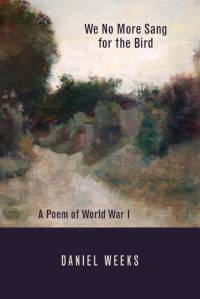Über We No More Sang for the Bird
Daniel Weeks's book of poetry, We No More Sang for the Bird, named for the final enigmatic phrase poet Edward Thomas inscribed in his journal before his death, tells the harrowing story of five British poets of different backgrounds-Rupert Brooke, T. E. Hulme, Wilfred Owen, Thomas, and Isaac Rosenberg-all of whom volunteered to serve their country during World War I and died in that service. The long opening poem, a lyrically rendered modern epic, and its six attendant hymns on the process of reading about these five poets' short lives provide a meditation on the nature of tragedy, the brutality of modern war, our own place in history's sweep, and the redemptive value of poetry.
Homer has risen from the Underworld to write this epic paean to the poets of World War I. But wait! It's Daniel Weeks who has revived Rupert Brooke, T. E. Hulme, Wilfred Owens, Edward Thomas, and Isaac Rosenberg. The immediacy, imagery, and music of We No More Sang for the Bird is so searing, we become these soldiers, intimately sharing their passions, fears, and desires.
This is a 4-D travelogue through time and space. With its vast embrace of history and literature, it supersedes dry texts on the war to end all wars. This is a jazz musician's masterpiece, syncopating political and personal notes. World War I poets were silenced. In this tour de force, Daniel Weeks takes up their song.
-Susanna Rich, author of SHOUT! Poetry for Suffrage
Like Siegfried Sassoon reading the younger Wilfred Owen's poems, "taking / words seriously even in war's wake, / noting the music they made," Dan Weeks too has read Owen's poems, as well as those of Rupert Brooke, T. E. Hulme, Edward Thomas, and Isaac Rosenberg, deeply and passionately, toward the making of his own poem, an epic of WWI focused on those poets caught up in its blood and "mothering mud." This ambitious, biographical, scholarly and wondrously wrought poem views the Great War from their perspectives: "We / were the little gods, [Brooke] mused, / his nose tucked in Webster or Donne / before turning to the soft abrasions / of an English sun." We No More Sang for the Bird is a major accomplishment.
-Michael Waters, author of Caw
What made some of the most gifted poets and thinkers of the early twentieth century offer themselves to the "calamitous war," "search out art /in grit and rawness," choose trenches over sentences, blood over ink? Was it love, pride, duty, the need to protect the mother tongue, the pull of immortality and the awareness that "the war needed its Homer, / its Whitman, someone to make sense/of senseless things"? In We No More Sang for the Bird, Dan Weeks awakens us to the impossibility of a single answer and, on rhythms of exquisite verve and elegance, he gifts us a tour de force. Carefully researched and bold in its empathic reach, the collection reads as ode, hymn, and dazzling historical retelling.
-Mihaela Moscaliuc, author of Cemetery Ink
Mehr anzeigen

